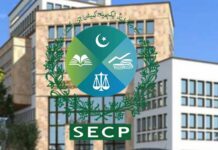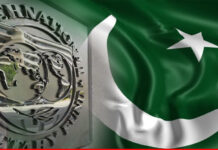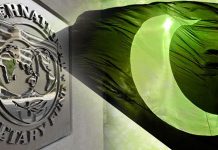
LAHORE: The International Monetary Fund (IMF) has said its discussions are ongoing with Pakistan toward reaching an understanding on policy priorities and on reforms to stabilize the economy.
IMF’s Director Communications Department Gerry Rice while speaking at a press briefing this past Thursday said that its staff was continuing discussions with the Pakistani authorities.
He said Pakistan had formally approached the IMF for a bailout request in October last year and a staff team paid a visit to Islamabad in November which concluded in the mid-of-November.
Mr Rice added “IMF staff are continuing discussions with the Pakistani authorities, with our counterparts, toward reaching an understanding on policy priorities, on reforms to stabilize the economy and lay the foundations for sustainable and inclusive growth.
So that’s where we are. We’ve had the formal request for financial assistance, we followed up with that and the discussions continue.”
Before the Christmas holidays in mid-December, Mr Rice while speaking at a press briefing had stated debt transparency is essential to conduct a proper analysis of the sustainability of a country’s debt and would be the same in Pakistan’s case.
“But one of the things that we do in every program is to have a very detailed debt sustainability analysis to ensure that indeed the country’s debt profile is sustainable.
So that kind of information and that level of detail will be available at such times as we reach conclusions on the discussions and go forward with the program,” said Mr Rice then.
On 13th January, Finance Minister Asad Umar while speaking at the Karachi Chamber of Commerce and Industry (KCCI) said that the government, for now, had decided not to enter an IMF programme and was looking into alternative options.
In a comment to Profit, Stephen Innes, Head of Trading, Asia Pacific at OANDA said, “ The IMF is suggesting prudent and specific revenue targets to shore up the government coffers.
But of course, raising taxes can be stifling for an economy especially one that is currently struggling.”
The first round of talks with the IMF had concluded on the 20th of November last year and it was expected further negotiations would start in the mid of January.
Several media reports hinted at IMF demanding reforms which the incumbent government is unwilling to take which include implementation of a free-float exchange rate mechanism, levying additional taxes and undertaking various reforms and curtail the budget deficit.
When asked about the IMF’s demand regarding the implementation of a free float exchange rate mechanism, Innes said he was a firm proponent of it.
Elaborating the issues with lower liquidity currency pairs, especially ones with duelling deficits, Mr Innes stated they fall under the crosshairs of currency speculators on the first buckle in the emerging market (EM) complex as external factors seem to be driving EM.
Moreover, Mr Innes stated that the central bank will need much more autonomy to US interest rates and currency markets to guide the markets.
However, he believed in the broader context, the market thinks the greenback will weaken in 2019 and the Pakistani rupee will catch a tailwind from that and continue to struggle on the domestic front.






















